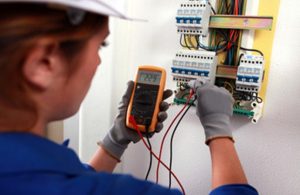
As manufacturing and processing facilities become more automated, instrumentation and control systems become more critical to their proper functioning. Technicians work diligently to ensure the instruments and controls are calibrated correctly to provide accurate and timely readings. When issues arise, they are responsible to diagnose and correct them.
Instrument technicians learn the basics of this industry by graduating from a comprehensive technical college program. Their skills are further honed on the job as they apply their skills and knowledge to practical projects and tasks. Superior electronics and instruments must be purchased and installed that produce the desired outcomes. They are absolutely needed for companies to stay afloat in a global economy.
Instruments Monitor Changes in the Environment and Processes
Instruments and control systems are required to monitor production, processing, and changes in the internal and external environments. Technicians use an assortment of instruments to record and report any changes they find. Techs must possess a solid understanding of the tasks associated with all instruments and their functioning.
An instrumentation team must select the best and most durable instruments and control systems to meet their company and industry needs. A team typically consists of these employees:
A variety of instruments are required to monitor production and processing variables including:
- Temperature and level
- Pressure, flow, and pH
- Metering and sensing
- Voltage, current, and power
The oil and gas industries are major users of instrumentation and control systems.
Technicians Monitor and Troubleshoot Instrument and Control Functions
 Instruments and controls are devices that show how production and processing are meeting or not meeting set standards. Technicians read the digital instruments and controls on a daily and in most cases hourly basis to ensure work is progressing correctly.
Instruments and controls are devices that show how production and processing are meeting or not meeting set standards. Technicians read the digital instruments and controls on a daily and in most cases hourly basis to ensure work is progressing correctly.
Technicians work on a schedule of monitoring instruments and controls and troubleshoot any problems or delays that occur. One of their essential functions is to eliminate or reduce downtime by checking readings on all instrumentation. They control processes by manipulating measured variables like temperature, pressure, and flow through automated systems.
| “Superior electronics and instruments must be purchased and installed that produce the desired outcomes. They are absolutely needed for companies to stay afloat in a global economy.” |
Technicians, also called Mechanics, Recommend Instrument Upgrades
Another function technicians/mechanics provide is recommending instrument upgrades that will improve any of these essential activities:
- Production
- Processing
- Accuracy
- Output
- Safety
- Control
Technicians work with plant operators and engineers to scan the market for new and improved instrumentation and control systems. They consider the company budget and visit other plants that are using new technology where possible. Once the team observes enough reasons to install new instrumentation, they check the prices and compare them with the budget.
Technicians train on any new upgrades that are installed. Instrument factory representatives will also provide knowledge on using new devices and the benefits they provide.
Effective Instrumentation and Control Systems Keep Companies Competitive
 There is no doubt that global manufacturing is becoming more competitive. Companies must keep their quality up while producing more in less time, and when possible, with fewer resources. With everything else being equal, technicians and engineers must keep on top of the production processes. High-quality instrumentation and control systems are a vital way to keep ahead of the competition.
There is no doubt that global manufacturing is becoming more competitive. Companies must keep their quality up while producing more in less time, and when possible, with fewer resources. With everything else being equal, technicians and engineers must keep on top of the production processes. High-quality instrumentation and control systems are a vital way to keep ahead of the competition.
By applying the latest in electronic technology and computer systems, U.S. industries are meeting the global challenges before them. They know that by effectively monitoring their product development and production they can keep people on the payroll and stockholders happy. Efficient instrumentation that is regularly monitored by skilled technicians is a vital key to success.
How to Become an Instrument Technician
If you like what you’ve read so far, are you interested in a career in Instrument and Control Systems Technology? Explore what ITI Technical College has to offer in our Associate of Occupational Studies (AOS) Degree Program.
Our faculty, staff, and administration work with you to ensure the successful completion of this comprehensive training program. We have a history of helping thousands of graduates find meaningful jobs in business and industry.
For more information about graduation rates, the median debt of students who completed the program, and other important information, please visit our website at: https://iticollege.edu/disclosures/





